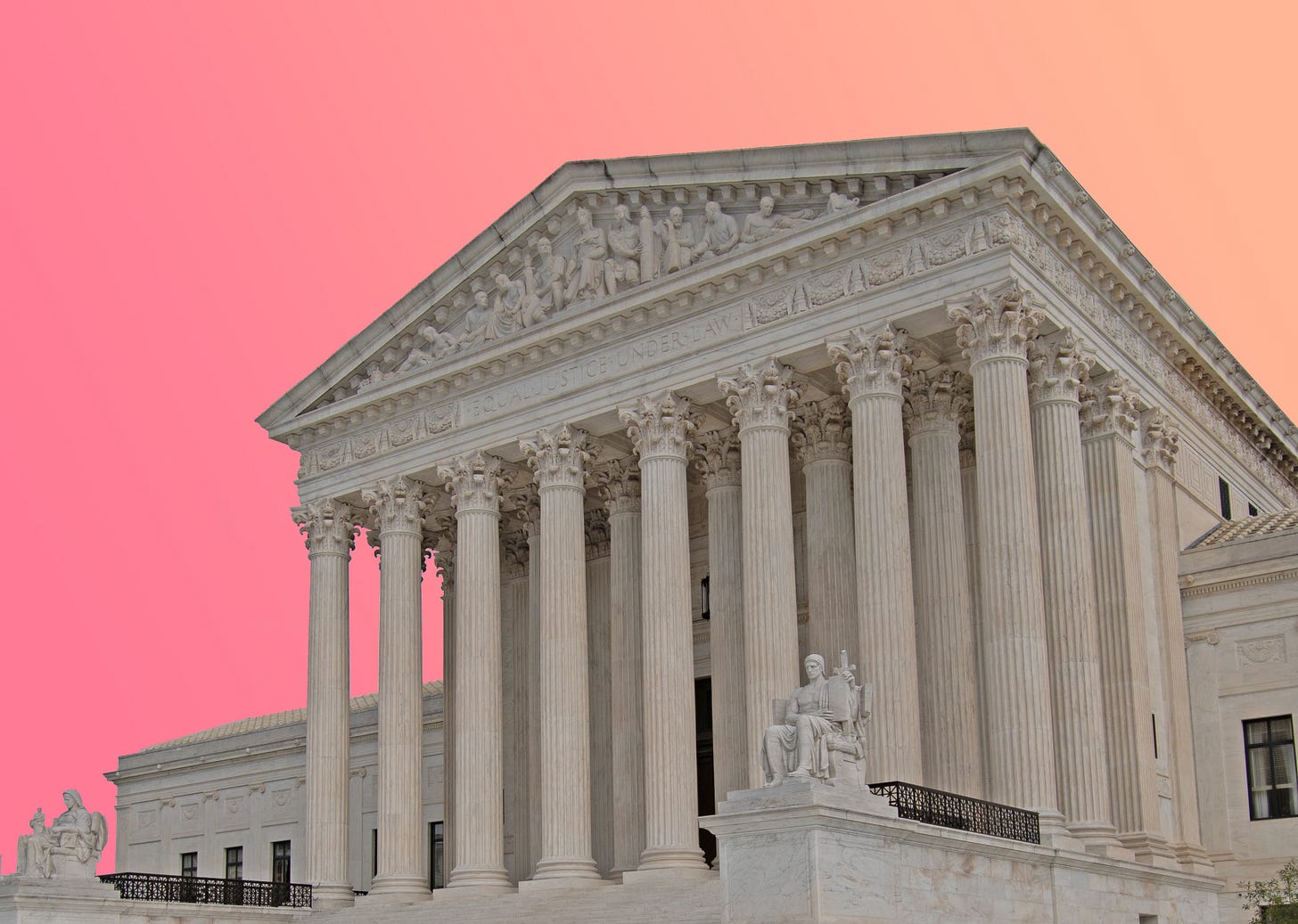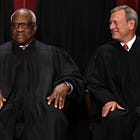"The Supreme Court is thinking about the Constitution all wrong"
Madiba Dennie on "The Originalism Trap."
PN is a reader-supported publication made possible by paid subscribers. Appreciate our independent journalism? Then please sign up to support us.
I recently had the pleasure of (virtually) sitting down with Madiba K. Dennie to talk about her new book, “The Originalism Trap: How Extremists Stole the Constitution and How We the People Can Take It Back.”
Madiba has written for The Atlantic and Washington Post and has been interviewed on the BBC and MSNBC, among other outlets. She was also previously counsel for the Brennan Center for Justice and taught at both Western Washington University and New York University School of Law. Currently, she is deputy editor at Balls and Strikes (full disclosure: I write for that outlet as well) where she provides legal commentary with equal parts rage and humor. Her writing on the judicial system has really helped shape my own thinking about the judicial system.
Madiba’s book is a must-read if you care about the future of the federal courts, which is something I know Public Notice readers are also passionate about. The book offers a searing critique of originalism, the doctrine of legal interpretation that’s a favorite of conservative justices because it somehow always guarantees conservative outcomes. Equally as important, though, it presents a vision for a way forward, which I’ll let Madiba explain more below.
Below is our email Q&A.
Lisa Needham
Tell me a bit about your background.
Madiba Dennie
I’m a Black immigrant woman, an attorney, and a writer, and I’m deeply committed to reimagining our political and legal systems so that we can build an inclusive democracy. The conservative legal movement is engaged in a systematic rollback of our rights, and I think part of fighting back against that needs to be demystifying the law for regular people. My work focuses on educating and empowering the public to think about the law differently and bring about lasting legal change. Currently I do so as the deputy editor and senior contributor at the critical legal commentary outlet Balls and Strikes. Also, I just wrote a book!
Lisa Needham
Your book is titled “The Originalism Trap.” Can you give me a quick overview of what originalism is?
Madiba Dennie
Originalism is the idea that the meaning of the Constitution is fixed in time, locked in when the Constitution’s provisions were ratified. If you asked an originalist how you should interpret the Constitution today, they would tell you there’s only one way you can legitimately interpret it: the way it was interpreted 200 years ago. This used to be a fringe idea. But over the past few decades, conservatives made it the dominant method of constitutional interpretation. The Supreme Court is now stacked with people who embrace the originalist ideology, and the country is suffering the consequences. By its own terms, originalism is essentially “Make the Constitution Great Again,” and the Court is using originalism to return the country to an inequitable version of the past.
Lisa Needham
Is originalism inherently suspect? Put another way, is there a non-disingenuous, non-conservative way to be an originalist?
Madiba Dennie
I do think originalism is inherently suspect, yes. Even if there was a single objective historical meaning of the Constitution (and there isn’t), and even if the Court relied on the finest historians to unearth that meaning (and it doesn’t), it would still be irresponsible to cast aside all the ways democracy has evolved in the intervening centuries and relinquish our right to self-governance. A well-intentioned liberal originalist would still be outsourcing constitutional interpretation to 18th century men who couldn’t possibly imagine a modern pluralistic society. That does a disservice to the whole nation, and poses an unique threat to historically marginalized people.
Lisa Needham
It seems like this book is arriving on the heels of a string of terrible decisions over the last several years. When did you first start thinking of writing the book?
Madiba Dennie
I think the leak of the Dobbs opinion was a turning point for me. That draft made it clear that the Court’s conservatives were going to take away women’s rights, and they were going to justify it by saying constitutional rights must be constrained by the prevailing viewpoints at a time when women didn’t have rights. It was also clear then that abortion was only the beginning: in the Court’s originalist telling, any right that isn’t “deeply rooted in the nation’s history and traditions” is suddenly constitutionally vulnerable. I felt very intensely, both as a Black woman and an attorney, that the originalist ideology was dangerous, and insultingly unintelligent. And it became urgent for me to explain to people — lawyers and nonlawyers alike — that the Supreme Court is thinking about the Constitution all wrong, and that we can choose to interpret the Constitution another way.
Lisa Needham
So, in contrast to originalism, you argue for inclusive constitutionalism. Can you explain what that means?
Madiba Dennie
Inclusive constitutionalism is the alternative interpretive method that I propose in “The Originalism Trap,” and at its core, it means that we need to interpret the Constitution in a way that makes inclusive democracy real. Originalism is ostensibly tied to a single point in time, and as a result, it bakes the biases and bigotries of that time into constitutional interpretation. This is why there’s a case before the Supreme Court arguing that it’s unconstitutional to disarm domestic violence offenders because the Framers didn’t protect women from gun violence either. Inclusive constitutionalism, in contrast, is tied to the principles of the Reconstruction Amendments, the whole point of which is breaking away from systems of subordination and building something better.
Lisa Needham
What are the Reconstruction Amendments, and what’s their role in this philosophy?
Madiba Dennie
The Reconstruction Amendments are the constitutional amendments enacted in the aftermath of the Civil War. There’s the Thirteenth Amendment, which formally abolished slavery, except as punishment for a crime. There’s the Fourteenth Amendment, which did a bunch of things, but for now I’ll just highlight that it prohibited states from violating people’s liberty and equality rights and authorized the federal government to enforce that prohibition. And there’s the Fifteenth Amendment, which prohibited racial discrimination in voting and again authorized the federal government to enforce that.
These Amendments remade the Constitution in order to remake the nation. They instruct us to create an equitable multiracial democracy in which everyone can live freely, equally, and with dignity. Inclusive constitutionalism argues that the whole Constitution must be interpreted through that lens. Legal interpretation should be guided by the Reconstruction Amendments’ expansive principles and their unfinished mission to foster a democratic society with equal membership for all.
Lisa Needham
What would the legal system look like if inclusive constitutionalism were the courts’ guiding philosophy? And what would the impact be?
Madiba Dennie
As for what the courts themselves should look like, I definitely think inclusive constitutionalism should work in conjunction with structural reforms. There’s just no universe where nine unaccountable people should have this much power over a nation of more than 300 million people for the rest of their natural lives. So I think court expansion and term limits are clear necessities, as is creating some limitations on the court’s authority. Inclusive constitutionalism would provide guidance on what those courts should do with the power that they have remaining.
Inclusive constitutionalist courts would protect people’s right to make decisions about their own bodies and to live with dignity. They would protect people’s right to make decisions about their communities and participate in the political process. And they would recognize all people as legitimate members of their communities.
Lisa Needham
I think people can feel very hopeless about the federal courts, not just because they’re stuffed to the gills with FedSoc hyper-conservatives, but also because it doesn’t seem like something an ordinary citizen can help fix. What can people do?
Madiba Dennie
There are always ways for ordinary people to fight back. Ordinary people always have! And it’s very helpful for me to remember that. I talk about a few different tactics and success stories in the book, and I think something they have in common is that they involve large numbers of people acting out their vision of what they think the Constitution should mean — like people who thought segregation should be unconstitutional refusing to ride segregated buses, or jurors who thought a form of protest shouldn’t be criminalized refusing to convict a group of protesters. Social movements succeed when they don’t necessarily accept what the courts say as the final word on the law. They instead work to convince enough other people that their view of the law is the right one. That’s what I want people to do with inclusive constitutionalism.
Lisa Needham
When is the book coming out, and where can readers buy it?
Madiba Dennie
“The Originalism Trap” came out last week! It’s available wherever books are sold, and the publisher’s website links to a bunch of sellers including Bookshop.org, which shares profits with independent bookstores.
That’s it for today
We’ll be back with more tomorrow. If you appreciate this edition of the newsletter, please support Public Notice by signing up. Paid subscribers make PN possible.
Thanks for reading.









If “Originalism” is to be strictly observed, wouldn’t all six of the right-wing court be ineligible? After all, not only do you have an African-American (3/5 vote) and a woman (chattel) … but all six were born Roman Catholic, ill-favored at the time.
They don’t care about rightness or wrongness. It’s about power. Concentrated economic power. And how that will concentrate their political power. It’s an un-American attitude and it’s naught but corruption.